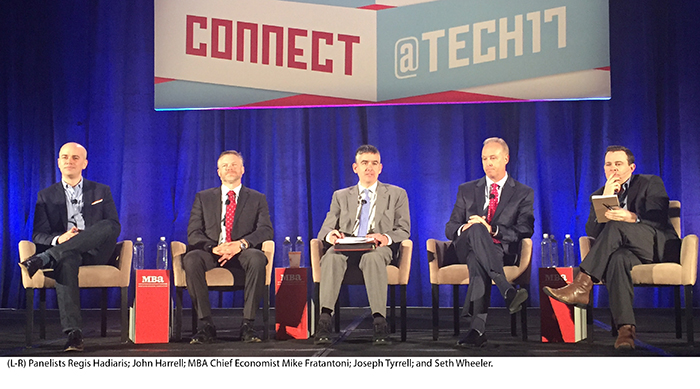
Fintech and Its Potential to Improve Customer Service
CHICAGO–Lenders are focusing on improving the customer experience. New entrants, fintech companies with cutting-edge technologies, have the potential to disrupt the mortgage market by providing a more seamless experience.
Last year, the 800-pound rocket in the room was Rocket Mortgage, Quicken Loans’ game-changing mortgage product. Today, said Regis Hadiaris, Rocket Mortgage Product Lead with Quicken Loans Inc., Detroit, Rocket Mortgage closes a loan every 60 seconds; a refinance takes place in nine days; a purchase loan 12 days.
 “A lot has been made about Rocket Mortgage,” Hadiaris said here at the MBA National Technology in Mortgage Banking Conference & Expo. “But the real story is that it’s the easiest and fastest way to complete a loan…customers love the speed and clarity of the game.”
“A lot has been made about Rocket Mortgage,” Hadiaris said here at the MBA National Technology in Mortgage Banking Conference & Expo. “But the real story is that it’s the easiest and fastest way to complete a loan…customers love the speed and clarity of the game.”
Another revolution taking place at Quicken is the fintech element, Hadiaris said. “This is resulting in big partnerships in Detroit,” he said. “Amazon is moving in to Detroit, as are other companies. Downtown Detroit is 100-percent occupied right now.”
John Harrell, vice president of real estate lending and product management with USAA, San Antonio, Texas, said USAA is working hard on the Day 1 Certainty initiative with Fannie Mae. “We are focusing on the customer experience right now,” he said. “Quality control is a big element of our focus, as reducing errors speeds the process and enhances the customer experience.
Joseph Tyrrell, executive vice president of corporate strategy with Ellie Mae Inc., Pleasanton, Calif., said the company is in a unique position–not as a lender, but in support of thousands of lenders who work with other companies.
“There is a lot of talk about how to enhance the customer experience,” Tyrrell said. “We’re seeing customers becoming more involved in the mortgage process. They want a good online experience, but they are also looking for the human touch. As we empower lenders to engage with consumers, we have to make sure that it’s not done in a single, inflexible way.”
Automation will only take the industry so far, Tyrrell said. “It also predicates our taking a closer look at the industry. The appraisal process, for example. How do we shorten the mortgage application process when an appraisal still takes three weeks? How do we enhance the customer experience when too often the first question we ask customers is ‘what is your address?’ We should already know that.”
Seth Wheeler, managing director of strategy, consumer and community banking with JPMorgan Chase, recently partnered with Roostify, San Francisco, for a digital mortgage product.
“If you’re not in the digital marketplace, you’re heading for a world of hurt,” Wheeler said. “In thinking of how to make Chase the easiest bank to work with, we recognize that there are some things we need to build ourselves and some in which we partner with others.”
Wheeler noted fintech has been around for decades, but has gained stature only recently. “The next generation is about data and creating the simplest touchpoints,” he said.
“When we think of fintech, it’s using technology to create a more efficient process,” Tyrrell said. “The challenge with fintech is that it’s not about using data. There are ramifications from a fair lending perspective; there are redlining issues. So you have to use data smartly.”
Ellie Mae uses data to determine, for example, where Millennials are buying homes. “We can determine why young women in Youngstown are buying homes there, but we also know that they tend to be single,” Tyrrell said. “So if you market to from a family formation standpoint, it might not work.”
“What we’re seeing playing out in our industry is something that plays out in any industry: will the large companies innovate, or will it come from the smaller companies?” Hadiaris said. “Innovations for consumers is where technology is going.”
In this scenario, Hadiaris said, smaller might not be more agile. “This is not easy, and it’s not easy for a smaller business,” he said. “To do that, you have to be a regulated entity that does business in all 50 states and all 3,154 counties that can keep up with 50 different state requirements and regulations.”
Harrell noted three options going forward: build; buy; or co-develop. “In the next few years, this concept of a digital mortgage is going to be a turnkey commodity,” he said. “What can you do that is better than anyone else? In most cases, it’s your ability to interact with customers.”
Engaging the workforce is also important, Tyrrell said. “We have to remember that Millennials are joining the workforce and we have to be responsive to their needs as well.”
